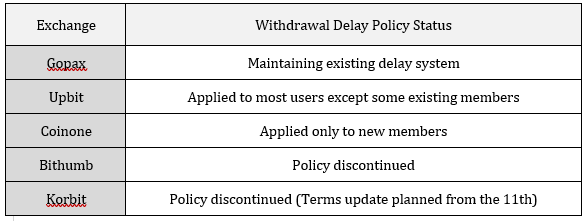
Cryptocurrency exchanges are reintroducing the ‘withdrawal delay system,’ which had been reduced or abolished in the second half of last year. This move comes in response to a surge in voice phishing crimes that exploited immediate asset transfers for laundering illicit funds.
The withdrawal delay system, which restricts users from withdrawing crypto assets until a certain time has passed after depositing Korean won, was once autonomously enforced by all exchanges.
However, following the implementation of the Virtual Asset User Protection Act in July last year, many exchanges lifted the restriction for the sake of user convenience. This decision, however, resulted in a notable increase in criminal abuse.

[Status of Withdrawal Delay Policy at Major Crypto Exchanges]
At Bithumb, for instance, the average number of voice phishing-related account freezes rose from 9 per month to 51 after abolishing the system—a staggering 1314% increase. Similarly, at Upbit, such incidents jumped from 29 to 125 cases per month, a 335% rise, after the system was partially scaled back. In response, financial authorities urged exchanges to reinstate the withdrawal delay system, and Korbit is now reviewing a revised terms of service to bring it back by the 11th.
This delay system is now seen as a critical safeguard for protecting victims of voice phishing. In typical fraud schemes, criminals gain access to a victim’s crypto account, deposit fiat currency, and instantly convert and transfer the assets to external wallets—making the trail hard to follow.






